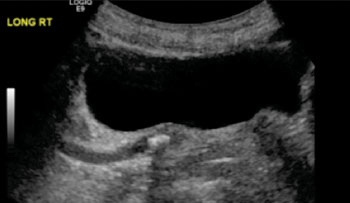CT Scans Are No More Effective Than Ultrasound Detecting Kidney Stones
By MedImaging International staff writers
Posted on 02 Oct 2014
To diagnose agonizing kidney stones in hospital emergency room environments, computed tomography (CT) scans have been found to be no better than less frequently-used ultrasound exams, according to a clinical study performed at 15 US medical centers. Posted on 02 Oct 2014
The study’s findings were published September 18, 2014, in the New England Journal of Medicine (NEJM). CT, dissimilar to ultrasound, exposes patients to significant amounts of radiation. Even though CT scans are preferred by emergency-room physicians for kidney stone diagnosis, ultrasound should be used first, according to senior study author Rebecca Smith-Bindman, MD, a professor in the departments of radiology; epidemiology and biostatistics; and obstetrics, gynecology and reproductive medicine at the University of California San Francisco (UCSF; USA).

Image: An ultrasound of the bladder showing a ureter blocked by a kidney stone (Photo courtesy of UCSF).
“Ultrasound is the right place to start,” Dr. Smith-Bindman said. “Radiation exposure is avoided, without any increase in any category of adverse events, and with no increase in cost." Patients in the study who were first examined with ultrasound sometimes received a follow-up CT exam at the physician’s discretion.
“Our results do not suggest that patients should undergo only ultrasound imaging, but rather that ultrasonography should be used as the initial diagnostic imaging test, with further imaging studies performed at the discretion of the physician on the basis of clinical judgment,” the study authors wrote.
Kidney stone rates are rising, and in a 2010 US National Health and Nutrition Examination Survey, one in 11 individuals reported having had at least one kidney stone. The use of CT to diagnose kidney stones has increased 10-fold in the last 15 years. CT exams typically are conducted by radiologists, while ultrasound exams may be conducted by emergency room physicians as well as radiologists.
Emergency room patients whose pain was suspected to be due to kidney stones were randomly assigned in the NEJM study to one of three imaging groups. In one group patients received an ultrasound exam performed by an emergency room physician on site. A second group received similar ultrasonography performed by a radiologist, a specialist in the procedure. The third group received an abdominal CT scan, also conducted by a radiologist.
With six months of patient follow-up, the study found that health outcomes for 2,759 patients were just as good with ultrasound as with CT, and that patients fared no worse when emergency physicians instead of radiologists performed the ultrasound exam. Serious adverse events, pain, return trips to the emergency department, or hospitalizations did not differ substantially among groups.
“New technology is developed all the time, and it’s hard to know when the new, sophisticated and expensive technology is better—in this case the simpler, cheaper, no-radiation technology is just as good,” Dr. Smith-Bindman said.
The study sites were emergency departments at academic medical centers throughout the United States, and included four “safety-net” hospitals serving low-income communities.
Related Links:
University of California, San Francisco














